By Lin Liping and Liang Youchang
Two front-runners in the race for Iran's next presidency -- incumbent President Mahmoud Ahmadinejad and former Prime Minister Mir-Hossein Mousavi -- seemed to have no favorite odds-on as their close contest entered the last day.
The impending election saw thousands of Iranians taking to the street in the last rallies on Wednesday to support their respective candidates who geared up rhetoric of accusing each other in their final struggle. No campaigns would be allowed from Thursday on, a day before the election day.
 |
|
Iranian President and candidate for the upcoming presidential election Mahmoud Ahmadinejad waves to supporters before addressing them in front of the Sharif University in Tehran June 10, 2009.[Xinhua]
|
Analysts have predicted the competition would be mainly between hard-line conservative Ahmadinejad and reformist Mousavi, but kept divergent opinions on who would finally win.
"My prediction (about the result of election) is that he (Ahmadinejad) will be elected as president for the second time," Mohammad Pirali, chief editor of Iran's conservative Siasat-e-Rooz(Daily Politics), said in a recent interview with Xinhua.
 |
|
Supporters of Iranian presidential hopeful Mir Hossein Mousavi, former Prime Minister, hold posters of Mousavi during a presidential election campaign in Teheran, capital of Iran, June 8, 2009. Thousands of backers of Mousavi formed a human chain here on Monday to support him in the presidential elections on June 12. [Ahmad Halabisaz/Xinhua]
|
Ahmadinejad has won supports, as well as criticism, for his tough polices towards the West and its economic spending.
During his current presidency since 2005, he has maintained a hard line towards the United States and Israel, who accused Iran of secretly developing nuclear weapons. He succeeded in speeding up Iran's nuclear activities, which are allegedly for peaceful energy use, despite pressure and sanctions by the West.